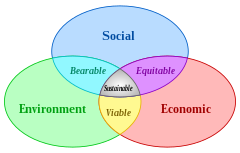Most of us have heard the phrase “sustainable development”
and perhaps a little about initiatives related to sustainable development such
as Agenda 21 and the Earth Charter. Many communities are exploring these
principles in the hope of heading off (or at least moderating) future
catastrophes.
Critics of organized sustainable development describe it as
a massive international conspiracy to deprive us of individual and capitalistic
rights. Actually, ignoring sustainability could actually deprive us of
freedoms. In fact, if we don’t start making better decisions and addressing
important sustainability problems now, we certainly will lose many options that we currently take for granted. Either
someone will step in to save us from ourselves, or abandon us to the
consequences that we bring down upon our own heads. My bet is that several
billion people will die in crisis and conflict before we adapt to the effects
of our changing climate.
Since we started living in communities, part of the deal has
always been that we can’t always do or take just anything we want. In America,
our constitution grants generous freedoms and liberties, but civility and
justice demand that our rights end in the vicinity of where our neighbors’
rights begin. The authority the American founding fathers wisely gave us to
regulate ourselves through government ensures important protections to us all.
Some insist that all natural resources are given by God to
man to own, subdue, and have dominion over (Genesis 1:28). Further, they argue
that man was given the physical and mental powers to accomplish this dominion. However,
this same scripture instructed him to be fruitful, multiply and fill the earth
– with no mention of limits. This sounds to me like a command to exercise
responsible, sustainable stewardship rather than a grant of free license to
dig, build, spew, kill and destroy.
Frankly, America has thrived economically for centuries
based on the exploitation of its abundant land, rivers, trees and mineral
resources. However, Native Americans discovered how little that freedoms and
rights mattered when private and business interests decided that, “they weren’t
using it, so why not just take it?” Now that national and global resources are
becoming scarce, who will be next to suffer from the greed of exploiters, and
who will we depend on to stop them?
Do we personally exploit? Automobiles, the open road and
cheap gasoline have been taken for granted as definingly American. A gas-guzzling
vehicle is a public symbol of status and achievement. Free public roads are also
taken for granted. We act as if we deserve the unlimited option to live, work,
play, shop, commute, and just drive around at will.
However, continued, unrestrained and unregulated
exploitation and consumption are not sustainable. We may think that only people
we don’t know and don’t care about are going to suffer. The fact is that the
vast majority of Americans are already experiencing the effects of
unsustainability. Our children will certainly suffer profoundly.
Only the very rich have the resources to consume, waste and pollute
conspicuously without immediate personal consequence. Believe me, they are
fighting for every political edge to protect their place of preeminent advantage
and control.
Do
you care about your grandchildren? Start explaining to them now about the importance
of sustainability. And, introduce them to the principles behind Agenda 21 and
the Earth Charter.
David Satterlee


